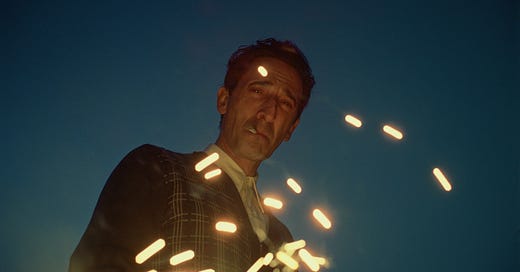We are offering a limited time 45 % off discount on annual subs.
Few filmmakers dare to make movies as imposing and grandiose as The Brutalist. Any such film seems to be begging for its Oscar. And after spectacular flops like Alexander and Exodus: Gods and Kings, we are inclined to approach it with more than a healthy dose of skepticism. Or perhaps it is as if we fear that something so big and bold will persuade us that it simply must be good if we do not prepare ourselves. The Brutalist deals with weighty, of-the-moment themes like the American Dream, the immigrant experience, artistic integrity and ambition, Holocaust trauma and—because it never gets old—power. It even has a built-in intermission.
The film chronicles the trials and tribulations of László Tóth (Adrien Brody), a Hungarian-Jewish architect and Holocaust survivor. He arrives in the United States in 1947 with the hope of rebuilding both his career and his fractured identity. His wife, Erzsébet (Felicity Jones), and niece, Zsófia (Raffey Cassidy), remain amid the rubble of post-war Europe. László must overcome the pain of their absence, the challenges of integrating into a world that claims to be free but is wary of newcomers, and of course the deep psychological scars that were left on any Jew who lived in Europe throughout the 1940s.
In his former life, László was a major Bauhaus architect, and he still harbours plenty of ambition. He is however stuck designing chairs with his cousin, Attila (Alessandro Nivola), who has for the most part shed his Hungarian-Jewish identity, taking the surname ‘Miller’ and becoming Catholic. László is thankful for the work, which is far beneath his talents, but will not let his identity go, despite the benefits that flow from ‘fitting in’. He is soon tossed a bone in the shape of a commission to redesign a library. The owner, a wealthy, WASPy industrialist called Harrison Lee Van Buren Sr. (Guy Pearce) is at first appalled to return to his mansion and find his library changed. But he comes round. And soon he takes László under his wing. Harrison tasks him with building a vast cultural centre in honour of his late mother, to whom he was very attached.
This commission becomes the focal point around which László’s hopes and struggles revolve. László must create; but he must do so beneath the crushing weight of patronage, in the sense both of sponsorship and of condescension, and society’s lively bias and blithe hostility towards immigrants in general and Jews in particular. Over three-and-a-half hours—there is an interval, remember—we explore László’s psychology, much-affected by his time in the Buchenwald concentration camp, and the outside forces in America that conspire to shape his fate. The first half, “The Enigma of Arrival,” chiefly concerns his experience as a newcomer yearning to breathe free, as it were; the second, “The Hard Core of Beauty,” the escalating challenge of building the cultural centre.
Central to The Brutalist is a study of displacement, identity, and the poisonous effects of unchecked ambition. László is the immigrant archetype: gifted but unappreciated, seeking to contribute to his adopted home, coming up constantly against ignorance and intolerance. The film also explores the confusion intrinsic to the bond between artist and patron, showing how creativity can be both nourished and thwarted by those who control the means of production. Equally, it considers the power relation between László and Harrison, the latter of whom, despite being wealthier, longs to be as artistically and intellectually rich as the former. Brutalism, a stark, unadorned, highly practical tradition, acts as a metaphor for the struggles of László: for his strength and isolation, for the security he lacks, for the tension between doing what he must and doing what he wants, the conflict between the artistic and the practical.
All of this is rendered quite beautifully through Brady Corbet’s direction and Lol Crawley’s cinematography, which captures the beauty of the physical and emotional landscapes inhabited by the characters. The film at times seems to glow. Moreover, the use of 70mm VistaVision gives a certain grandeur to the film, plunging us into the period setting and putting László’s creations on a monumental scale. Daniel Blumberg’s score is outstanding: at once unsettling and triumphant. Its discordant melodies evoke László’s turbulent inner life and the distance between his ideals and reality.
Brody gives a masterful performance in conveying, without words, a whole cocktail of intensity, pride, pain, frustration and aspiration. Jones portrays Erzsébet as mentally strong yet physically frail, if someone with a very, very ropey accent; and her character serves as a kind of counterpoint to László, whose stoicism never quite conceals his pain. Pearce’s Van Buren seems hammy in the first instance; but as the story unfolds we understand that he himself is, in a way, trying to fit in, and is clearly grappling with his own demons and keen to keep up appearances. He has the capacity for outward charm and even something like kindness, but his elitism is deeply rooted. He is visibly, highly sensitive to hierarchy, as is his copycat son.
The Brutalist is has been taken apart for architectural, linguistic and cultural inauthenticity. AI was used to clean up some of the Hungarian accents and generate architectural blueprints. I am not too bothered by this. If the film is good, the film is good, I say: and anyway, you cannot please everyone. If it has flaws (it does) then these are to do with the looseness of the psychosexual thread that runs through the film, the lopsidedness of the thing (the first half is much better than the second) and an unforgivably on-the-nose scene in Part II. It could be tighter. There are some very, very long pauses. But take it all in all, it is a huge achievement, a near-masterpiece. It is one of those sprawling work of cinematic arts endlessly open to discussion and interpretation, and one that concerns timeless themes around the community’s relation to the outsider, the role of art in organising the mental chaos induced by trauma, the nature of power and money, the necessity (or not) of artistic integrity, the animating myths of society … Should I continue?
To the boring charge that culture has become shallow, McNuggetised, incapable of saying anything of use or interest about the human experience, I say: make haste to your local cinema, get yourself a nice bottle of wine, and watch The Brutalist.





